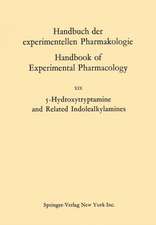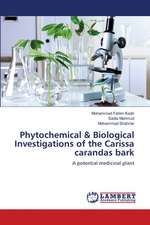Biochemical Pharmacology of Blood and Bloodforming Organs: Handbook of Experimental Pharmacology, cartea 101
Editat de James W. Fisher Contribuţii de K. Agrawal, B.S. Beckman, R.L. Capizzi, M. Dugdale, A.C. Eaves, C.J. Eaves, J.W. Fisher, G.A. FitzGerald, R.A. Joyce, D.M. Kerins, R.D. Lange, M. Mason-Garcia, T.P. McDonald, D.C.B. Mills, J. Nakashima, P. J. Quesenberry, J. B. Smith, L.R. Solomon, J.L. Spivaken Limba Engleză Paperback – 19 ian 2012
Din seria Handbook of Experimental Pharmacology
- 5%
 Preț: 3517.78 lei
Preț: 3517.78 lei - 5%
 Preț: 1425.97 lei
Preț: 1425.97 lei - 5%
 Preț: 1435.28 lei
Preț: 1435.28 lei - 5%
 Preț: 1430.52 lei
Preț: 1430.52 lei - 5%
 Preț: 1930.69 lei
Preț: 1930.69 lei - 5%
 Preț: 1922.47 lei
Preț: 1922.47 lei - 5%
 Preț: 1937.46 lei
Preț: 1937.46 lei - 5%
 Preț: 2117.58 lei
Preț: 2117.58 lei - 5%
 Preț: 2119.96 lei
Preț: 2119.96 lei - 5%
 Preț: 2117.38 lei
Preț: 2117.38 lei - 5%
 Preț: 1088.17 lei
Preț: 1088.17 lei - 5%
 Preț: 1098.27 lei
Preț: 1098.27 lei - 5%
 Preț: 1420.29 lei
Preț: 1420.29 lei - 5%
 Preț: 1104.84 lei
Preț: 1104.84 lei - 5%
 Preț: 1104.84 lei
Preț: 1104.84 lei - 5%
 Preț: 1108.14 lei
Preț: 1108.14 lei - 5%
 Preț: 1106.69 lei
Preț: 1106.69 lei - 5%
 Preț: 1105.77 lei
Preț: 1105.77 lei - 5%
 Preț: 1174.35 lei
Preț: 1174.35 lei - 5%
 Preț: 1432.50 lei
Preț: 1432.50 lei - 5%
 Preț: 408.48 lei
Preț: 408.48 lei - 5%
 Preț: 409.63 lei
Preț: 409.63 lei - 5%
 Preț: 539.90 lei
Preț: 539.90 lei - 5%
 Preț: 720.47 lei
Preț: 720.47 lei - 5%
 Preț: 731.27 lei
Preț: 731.27 lei - 5%
 Preț: 746.43 lei
Preț: 746.43 lei - 5%
 Preț: 747.72 lei
Preț: 747.72 lei - 5%
 Preț: 725.24 lei
Preț: 725.24 lei - 5%
 Preț: 742.80 lei
Preț: 742.80 lei - 5%
 Preț: 393.23 lei
Preț: 393.23 lei - 5%
 Preț: 735.66 lei
Preț: 735.66 lei - 5%
 Preț: 728.33 lei
Preț: 728.33 lei - 5%
 Preț: 389.52 lei
Preț: 389.52 lei - 5%
 Preț: 730.71 lei
Preț: 730.71 lei - 5%
 Preț: 740.58 lei
Preț: 740.58 lei - 5%
 Preț: 730.19 lei
Preț: 730.19 lei - 5%
 Preț: 723.42 lei
Preț: 723.42 lei - 5%
 Preț: 731.27 lei
Preț: 731.27 lei - 5%
 Preț: 726.68 lei
Preț: 726.68 lei - 5%
 Preț: 3516.49 lei
Preț: 3516.49 lei - 5%
 Preț: 729.26 lei
Preț: 729.26 lei - 5%
 Preț: 737.11 lei
Preț: 737.11 lei - 5%
 Preț: 730.92 lei
Preț: 730.92 lei - 5%
 Preț: 738.78 lei
Preț: 738.78 lei - 5%
 Preț: 909.94 lei
Preț: 909.94 lei - 5%
 Preț: 720.10 lei
Preț: 720.10 lei - 5%
 Preț: 734.74 lei
Preț: 734.74 lei - 5%
 Preț: 727.80 lei
Preț: 727.80 lei
Preț: 733.09 lei
Preț vechi: 771.68 lei
-5% Nou
Puncte Express: 1100
Preț estimativ în valută:
140.32€ • 152.47$ • 117.95£
140.32€ • 152.47$ • 117.95£
Carte tipărită la comandă
Livrare economică 22 aprilie-06 mai
Preluare comenzi: 021 569.72.76
Specificații
ISBN-13: 9783642758676
ISBN-10: 3642758673
Pagini: 612
Ilustrații: XVI, 587 p.
Dimensiuni: 155 x 235 x 32 mm
Greutate: 0.85 kg
Ediția:Softcover reprint of the original 1st ed. 1992
Editura: Springer Berlin, Heidelberg
Colecția Springer
Seria Handbook of Experimental Pharmacology
Locul publicării:Berlin, Heidelberg, Germany
ISBN-10: 3642758673
Pagini: 612
Ilustrații: XVI, 587 p.
Dimensiuni: 155 x 235 x 32 mm
Greutate: 0.85 kg
Ediția:Softcover reprint of the original 1st ed. 1992
Editura: Springer Berlin, Heidelberg
Colecția Springer
Seria Handbook of Experimental Pharmacology
Locul publicării:Berlin, Heidelberg, Germany
Public țintă
Professional/practitionerCuprins
1 Introduction.- 2 Fundamental Control of Hematopoiesis.- A. Introduction.- B. Hierarchical Organization of Hematopoietic Cells.- C. Assay and Characterization of In Vitro Clonogenic Cells.- D. Use of In Vitro Clonogenic Cell Assays.- E. Newer Assays for More Primitive Cells.- F. Regulatory Mechanisms.- G. Future Outlook.- References.- 3 Kidney Regulation of Erythropoietin Production.- A. Introduction.- B. Model for the Control of Erythropoietin Production.- C. Hypoxia and Erythropoietin Production.- D. Adenosine and Erythropoietin Production.- References.- 4 The Mechanism of Action of Erythropoietin: Erythroid Cell Response.- A. Introduction.- B. Model Systems for Studying the Interaction of Erythropoietin with Erythroid Progenitor Cells.- C. Interaction of Other Growth and Development Factors with Erythroid Progenitor Cells.- D. The Erythroid Differentiation Program.- E. Signal Transduction in Erythroid Progenitor Cells.- F. Erythropoietin as a Competence or Progression Factor.- G. Conclusion.- References.- 5 The Arachidonic Acid Cascade and Erythropoiesis.- A. Introduction.- B. Evidence for the Roles of Arachidonic Acid Metabolism in Erythropoiesis.- C. Future Directions for Research.- References.- 6 Iron Deficiency and Megaloblastic Anemias.- A. Iron-Deficiency Anemia.- B. Megaloblastic Anemias.- References.- 7 Erythropoietin in the Anemia of End-Stage Renal Disease.- A. Assay of Erythropoietin.- B. Pathogenesis of the Anemia of Chronic Renal Failure.- C. Kidney Production of Erythropoietin.- D. Erythropoietin in Therapy of Renal Anemia.- E. Conclusions.- References.- 8 Humoral Control of Thrombocytopoiesis.- A. Introduction.- B. Model for Megakaryocytopoiesis.- C. Controlling Factors.- D. Other Factors Affecting Thrombocytopoiesis.- E. Clinical Aspects of Thrombopoietin.- F. Future of Thrombopoietin.- References.- 9 Arachidonic Acid Metabolism Platelets and Thromboembolic Disease.- A. Arachidonic Acid Metabolism.- B. Thromboembolic Disease.- C. Concluding Comments.- References.- 10 Chemical Agents That Inhibit Platelet Aggregation.- A. Introduction.- B. Platelet Physiology.- C. Platelet Structure.- D. Platelet Involvement in Thrombosis.- E. Platelet Responses.- F. Inhibition of Platelet Aggregation.- G. Conclusions.- References.- 11 Anticoagulants, Antithrombotic and Thrombolytic Agents.- A. Anticoagulants.- B. Thrombolytic Therapy.- C. Antithrombotic Therapy.- References.- 12 Granulocyte-Macrophage Growth Factors.- A. Introduction.- B. Historical Background.- C. Growth Factors.- D. Other Interleukins.- E. Inhibitors.- F. Cellular Production and Networking.- G. Microenvironment.- H. Conclusions.- References.- 13 Chemical Agents Which Suppress Myelopoiesis: Agranulocytosis and Leukemia.- A. Introduction.- B. Normal Marrow Cell Kinetics.- C. Pathophysiologic Mechanisms for Drug-Induced Neutropenia.- D. Neutropenia Associated with Cytotoxic Chemotherapeutic Agents.- E. Drug-Induced Myeloid Suppression.- F. Idiosyncratic Neutropenias.- G. Pseudoneutropenia.- H. Secondary Leukemia.- J. Conclusions.- References.- 14 Drugs Useful in the Chemotherapy of the Acute Leukemias.- A. Introduction.- B. Antimetabolites.- C. Drugs that Intercalate in DNA.- D. Podophyllotoxin Derivatives.- E. Vinca Alkaloids.- F. Alkylating/DNA Binding Agents.- G. Adrenal Glucocorticoids.- H. Enzymes.- J. Multidrug Resistance.- References.














